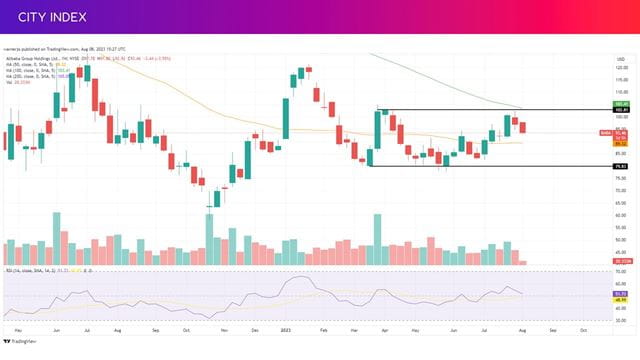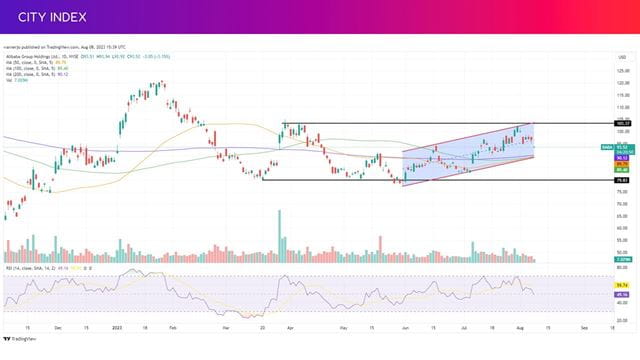
Key takeaways
- Alibaba shares trade below pre-pandemic levels, despite China abandoning its fight against Covid-19 and its crackdown on internet and tech companies
- Chinese economy showing signs that domestic and international demand is in steep decline
- Alibaba embarks on a new financial year with ambitions to break itself up into independently listed businesses
- Alibaba likely to prioritise profitability for individual units ahead of listings
- IPO market remains unfavourable and must improve to maximise chances of success
Alibaba earnings date
Alibaba will release first quarter earnings before US markets open on Thursday August 10. A conference call is scheduled on the same day at 0730 ET (1930 HK).
Alibaba earnings consensus
Revenue is forecast to rise 8.6% year-on-year to RMB223,241 million in the first quarter and adjusted EPS per ADS is seen rising 20% to RMB14.09.
Alibaba earnings preview
The outlook looks both exciting and challenging for Alibaba as it begins to break itself up into six different business units in the hope of unlocking value following a tough few years plagued by headwinds, including but not limited to pandemic disruption and regulatory pressure, that have severely knocked its valuation.
The shake-up will ultimately see Alibaba spin-off five business units covering retail, cloud computing, ecommerce, local services and food delivery in China, logistics, and digital media and entertainment. We are likely to see the first spin-offs this financial year, although it could take years to complete them all.
Still, markets have not been convinced considering Alibaba shares are trading lower today than they were before the pandemic started in 2020, despite the fact that China has put Covid-19 behind it and ended its crackdown on internet and tech companies. That has left Alibaba trading at just 10.9x its forecasted earnings over the next 12 months, below its five-year historical average of 12.2x and at a discount to rivals like JD.com and Pinduoduo.
Alibaba will need to tread carefully to ensure each spin-off secures the right valuation and has the confidence of the markets, given the fact the IPO market remains in a drought as the uncertain outlook prompts companies to delay their plans and the poor performance of those that have dared taken the plunge in what has been a volatile few years. If successful, it could yield big rewards by reducing the need for Alibaba to fund costly operations (that are mostly still in the red) while maintaining significant stakes, while allowing each business to raise its own cash and grow at a quicker pace. A misstep risks potentially billions in value and undoing the hard work completed so far.
There is widespread expectation that Alibaba will prioritise profitability over growth for the units it plans to separate first, which is expected to be its Freshippo grocery unit and its logistics arm. Ultimately, the restructuring will leave Alibaba we know today with its core and already profitable Taobao and Tmall ecommerce platforms, as well significant stakes in the businesses it spins-off and lists.
You can read more about the spin-offs in Everything You Need to Know About the Alibaba IPOs.
Plus, the lacklustre performance from the Chinese economy since it was reopened after the government abandoned its fight against Covid-19 hasn’t helped. Alibaba was among those to slump in wake of the latest figures out of China that showed both imports and exports declined much faster than anticipated in July, fuelling fears that conditions are deteriorating and that both international and domestic demand is waning faster than anticipated. Importantly, key inflation data comes out of China before the results, which will set the tone in what is shaping-up to be a gloomy narrative.
Still, Alibaba will be coming up against easier comparatives this financial year and the economy is performing better now than it was in lockdown. This is expected to see Alibaba’s ecommerce operations in China return to sales growth for the first time in over a year this quarter, which would also aide its logistics and local services divisions. A miss here would only add to concerns about the Chinese economy.
This will be closely watched now that it is at the centre of Alibaba’s future, at a time when competition is becoming far more intense. The need to compete may hit profitability, which could absorb any benefits arising from immediate cost-savings or efficiencies gained from its restructuring. Its international ecommerce arm also continues to expand at pace but remains loss-making.
Elsewhere, its digital media and entertainment arm appears to be gaining traction while its cloud computing unit is experiencing much slower growth compared to last year as it follows softer conditions as businesses pullback on spending.
Alibaba is potentially a big contender in the race for AI supremacy considering cloud computing power provides the essential infrastructure needed for the breakthrough technology, and media reports suggest it has also recently launched new large-language models to provide another potential catalyst. US rivals like Microsoft and Alphabet have warned they need to spend big to get their cloud computing arms fit for the influx of AI demand and Alibaba could follow, although that will be more of a problem for the division rather than Alibaba going forward considering it plans to spin-off the business before May 2024.
Fundamentals: Where next for Alibaba stock?
Alibaba was a big winner during the pandemic as its dominant position in ecommerce, digital media and cloud computing placed it in the perfect position to serve consumers during lockdown but it has been a rocky few years. It is now trying to overhaul itself and emerge a stronger business, or should I say businesses.
Still, markets have not been enticed by the plan, nor by the performance of the Chinese economy. The stock is down 70% from the peaks we saw in 2020 and it trades at a discount of around 38% to its industry rivals.
This could suggest there is more upside potential than downside, although Alibaba still has a massive job in completing five successful spin-offs. Plus, conditions from the IPO market are still poor and the Chinese economy is showing worrying signs – and both of these will prove critical into how Alibaba’s financial performance and restructuring pans-out over the coming 12 months.
Technical: Where next for BABA stock?
Starting with the weekly chart, we can see Alibaba shares have drifted between a range of $80 and $103 over the past five months, with the upper limit roughly aligned with the 100-day moving average that has been out of reach for over two years.

We can see this figures are also in play on the daily chart. All three moving averages are converging around $89-$90 mark, making it a potential level of support if Alibaba comes under pressure. That would also be aligned with the level of support that could come from a tentative rising parallel channel.
The 49 brokers that cover Alibaba currently have an average target price of $137, implying there is over 46% potential upside from current levels.

Take advantage of extended hours trading
Alibaba will release earnings before markets open and most traders must wait until they can trade. But by then, the news has already been digested and the instant reaction in share price has happened in extended-hours trading. To react immediately, traders should take their positions in pre-and post-market sessions.
With this in mind, you can take advantage of our service that allows you to trade Alibaba and other Big Tech stocks using our extended hours offering.
While trading before and after hours creates opportunities for traders, it also creates risk, particularly due to the lower liquidity levels. Find out more about Extended Hours Trading.
How to trade Alibaba stock
You can trade Alibaba and the Nasdaq 100 with City Index in just four easy steps:
- Open a City Index account, or log-in if you’re already a customer.
- Search for ‘Alibaba’ in our award-winning platform
- Choose your position and size, and your stop and limit levels
- Place the trade
Or you can practice trading risk-free by signing up for our Demo Trading Account.










